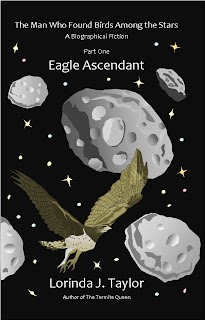 |
| http://amzn.to/2ytDmt8 |
Taylor’s world-building continues to be first-rate—I particularly enjoyed her depiction of the Martian colony and the delightful term she uses for the Red Planet’s settlers: “humartians.” The sprawling world is rich with plenty of detail and a huge cast of supporting characters.
There are more philosophical asides in this book than in earlier installments—commentary from the narrator on the protagonist’s highly questionable and emotional decision-making. This is more of a romance than the previous ones. Maybe “romance” isn’t quite the term—it’s a true biographical novel, as the subtitle implies. As I was reading it, I realized that in many ways it’s a throwback to an older style of novel: the long, winding sort of tale popular in the Victorian era. Except, of course, set in the 28th century.
There’s a hint of spirituality woven in, too—as in one scene where Nikalishin and a character by the name of Fedaylia High Feather speak with a priest—or “prayst,” as he is called in the Eirish dialect. It’s a powerful scene, and reveals a lot about the characters. I won’t say much about Fedaylia High Feather. How can you resist wanting to meet a character with a name like that for yourself, eh? But I will say this: I think it’s interesting that we are informed she was born on April 30, a date which followers of this blog may recognize as the semi-obscure holiday of Walpurgis night, a sort of Spring equivalent of Halloween. And Nikalishin, of course, was born on Halloween itself. Whether the author had this in mind when choosing these dates, I don’t know, but I thought it was interesting.
As previously, Nikalishin’s pathetic inability to form normal relationships with women continues to be a problem for him, and made me want to shout “Oh, grow up, man!” And to be clear, this is a criticism of the character, not of the writing. Taylor succeeds quite well in crafting a careful portrait of Nikalishin’s extremely irregular psychology.
I would love to talk at length about all these peculiarities of Nikalishin’s, as well many other things, but the fact is, more people need to read these books first, and I won’t risk spoiling them for others by discussing details here, when there is a very real chance this may be the first time some readers learn of their existence. The world of The Man Who Found Birds Among The Stars is one that more science fiction lovers need to discover for themselves.
Thank you for the great review!
And check out Berthold's books here:
https://www.amazon.com/s?k=berthold+gambrel&crid=ANAM1H2DHZWX&sprefix=Berthold%2Caps%2C205&ref=nb_sb_ss_i_7_8


![The Korinniad by [A. K. Caggiano]](https://m.media-amazon.com/images/I/5117V+4oweL.jpg)



![Cornerstone: The Delving by [Krisko, K.A.]](https://images-na.ssl-images-amazon.com/images/I/51IueDhjtyL.jpg)











